Letterpop
5 Powerful Techniques to Help Your Posts Stand Out
Paradigm Online Writing Assistant
How did this page of quality lessons come about? In 2005, WritingFix and the Northern Nevada Writing Project received a generous grant that helped begin the very popular lesson collection you will find on this page. The generous $25,000 AT&T Grant, acquired with the help of the Washoe Education Foundation, allowed us to design and host a very different kind of inservice class for 100 Northern Nevada teachers, and that inservice made possible this page. Members of the Northern Nevada Writing Project's Technology Team created and demonstrated eight brand new picture book lessons to the first 100 teachers who signed up; they then gave away 100 copies of each of the picture books so that class participants could teach any of the lessons back in their classrooms. Our Picture Book Inservice continues in Northern Nevada. "Your [Picture Books] inservice is--by far--the most valuable class I have ever taken as a teacher.
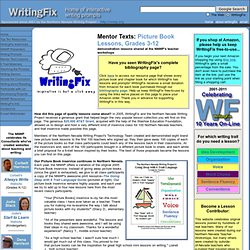
Mentor Text Lessons...inspired by Picture Books
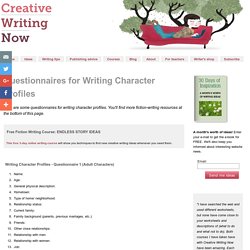 Enter your e-mail to get the e-book for FREE. We'll also keep you informed about interesting website news. "I have searched the web and used different worksheets, but none have come close to your worksheets and descriptions of (what to do and what not to do). Both courses I have taken have with Creative Writing Now have been amazing. Each time I have learned something new. The one thing I love, you take everything apart and give examples." - Katlen Skye "As usual - I already love the course on Irresistible Fiction, rewriting a lot and improving greatly even after the first lesson. “Essentials of Fiction proved that I could indeed write and I wrote every day, much to my boyfriend's dismay (waa sniff).” - Jill Gardner "I am loving the course and the peer interaction on the blog is fantastic!!!" "I'm enjoying the weekly email course, Essentials of Poetry Writing. "Thank you for all the material in this course. "Thanks very much for this course. "I'm learning so much. "Thank you so much!!
Enter your e-mail to get the e-book for FREE. We'll also keep you informed about interesting website news. "I have searched the web and used different worksheets, but none have come close to your worksheets and descriptions of (what to do and what not to do). Both courses I have taken have with Creative Writing Now have been amazing. Each time I have learned something new. The one thing I love, you take everything apart and give examples." - Katlen Skye "As usual - I already love the course on Irresistible Fiction, rewriting a lot and improving greatly even after the first lesson. “Essentials of Fiction proved that I could indeed write and I wrote every day, much to my boyfriend's dismay (waa sniff).” - Jill Gardner "I am loving the course and the peer interaction on the blog is fantastic!!!" "I'm enjoying the weekly email course, Essentials of Poetry Writing. "Thank you for all the material in this course. "Thanks very much for this course. "I'm learning so much. "Thank you so much!!
Questionnaires for Writing Character Profiles - Creative Writing Help
Writing
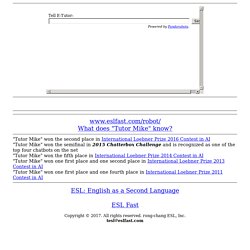 www.eslfast.com/robot/ What does "Tutor Mike" know? "Tutor Mike" won the second place in International Loebner Prize 2016 Contest in AI "Tutor Mike" won the semifinal in 2015 Chatterbox Challenge and is recognized as one of the top four chatbots on the net "Tutor Mike" won the fifth place in International Loebner Prize 2014 Contest in AI "Tutor Mike" won one first place and one second place in International Loebner Prize 2013 Contest in AI "Tutor Mike" won one first place and one fourth place in International Loebner Prize 2011 Contest in AI ESL: English as a Second LanguageESL Fast Copyright © 2017. All rights reserved. rong-chang ESL, Inc.tesl eslfast.com
www.eslfast.com/robot/ What does "Tutor Mike" know? "Tutor Mike" won the second place in International Loebner Prize 2016 Contest in AI "Tutor Mike" won the semifinal in 2015 Chatterbox Challenge and is recognized as one of the top four chatbots on the net "Tutor Mike" won the fifth place in International Loebner Prize 2014 Contest in AI "Tutor Mike" won one first place and one second place in International Loebner Prize 2013 Contest in AI "Tutor Mike" won one first place and one fourth place in International Loebner Prize 2011 Contest in AI ESL: English as a Second LanguageESL Fast Copyright © 2017. All rights reserved. rong-chang ESL, Inc.tesl eslfast.com
Etherpad Lite
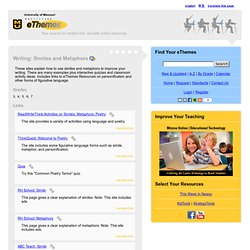 Global rating average: 0.0 out of 50.00.00.00.00.0 These sites explain how to use similes and metaphors to improve your writing. There are many examples plus interactive quizzes and classroom activity ideas. Includes links to eThemes Resources on personification and other forms of figurative language. Grades Links ReadWriteThink Activities on Similes, Metaphors, Poetry This site provides a variety of activities using language and poetry. Education Standards Request State Standards
Global rating average: 0.0 out of 50.00.00.00.00.0 These sites explain how to use similes and metaphors to improve your writing. There are many examples plus interactive quizzes and classroom activity ideas. Includes links to eThemes Resources on personification and other forms of figurative language. Grades Links ReadWriteThink Activities on Similes, Metaphors, Poetry This site provides a variety of activities using language and poetry. Education Standards Request State Standards
Writing: Similes and Metaphors
WritingFix: prompts, lessons, and resources for writing classrooms
Submitted by NWREL Staff Name: Bad Analogies Traits: Ideas, Sentence Fluency Grade Level: Middle School (6-8), High School (9-12) Time: Two or more class periods Supplies:Examples (in pdf file) of bad and good analogies, writing materialsLesson Description: 1) This lesson should follow discussion and activities relating to literary terms. 2) Students are bound to write some bad analogies on their own, so this lesson brings them out into the open where everyone can have some fun with them. 3) Share some example of both good and bad analogies--what makes the good ones good, what makes the bad ones bad. 4) Students should then write two bad analogies, one good one, and borrow a professional example from literature, formatted in this order for display. Note: If a lesson plan has an associated worksheet, it is available for download in PDF format, which requires the free Acrobat Reader plug-in.
6+1 Trait® Writing Assessment Lesson Plans | Education Northwest
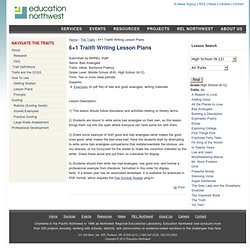
writing project
This piece is about collecting stories and ideas from life and from the internet. Writer Jonathan Harris, in this TED Talk explains his unique vision of how stories can be found in the artifacts left on a street corner, harvested from blogs with with bots, or captured by camera while exploring Inuit whaling camps in Barrow Alaska. The talk ends with a photo essay themed on happiness and wishes found in the Kingdom of Bhutan. Harris interviewed over a hundred folks found along the paths of Bhutan. He asked each to write one wish on a balloon. This man creates technology generated mind-maps that go way beyond the solo clustering we sometimes teach as idea generation. Harris is a traveler, thinker, and creator. video: Jonathan's website:
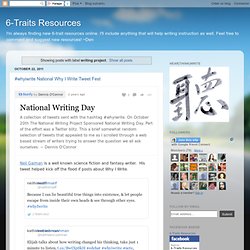
 In traditional literary theory, it is assumed that when we read a work of literature we are trying to find a meaning which lies inside that work. Literary texts possess meaning, and that is why readers extract meaning from them. The process of extracting meaning from texts is called interpretation. However, in contemporary literary and cultural theory such ideas have been radically changed. It is now believed that works of literature are built from systems, codes, and traditions established by previous works of literature. It is claimed that the act of reading, rather than the interpretation of one work, engages the reader in discovering a network of textual relations. The word “intertextuality” derives from the Latin intertexto, meaning to ‘mingle while weaving’ (Keep et al 2000). The origins of intertextuality, like modern literary and cultural theory itself, can be traced back to 20th-century linguistics. “Any text is a new tissue of past citations. Resources:
In traditional literary theory, it is assumed that when we read a work of literature we are trying to find a meaning which lies inside that work. Literary texts possess meaning, and that is why readers extract meaning from them. The process of extracting meaning from texts is called interpretation. However, in contemporary literary and cultural theory such ideas have been radically changed. It is now believed that works of literature are built from systems, codes, and traditions established by previous works of literature. It is claimed that the act of reading, rather than the interpretation of one work, engages the reader in discovering a network of textual relations. The word “intertextuality” derives from the Latin intertexto, meaning to ‘mingle while weaving’ (Keep et al 2000). The origins of intertextuality, like modern literary and cultural theory itself, can be traced back to 20th-century linguistics. “Any text is a new tissue of past citations. Resources:
An introduction to intertextuality
Contraintes
99 notes préparatoires Graphe Juliennes N-ine n X prend Y pour Z Zeugme dessiné
147650
Mugshots: where you make the character!
"How to Write an Essay -- 10 Easy Steps": A Step-by-Step Guide For Students Writing Essays, or For College Instructors Teaching Essay Writing
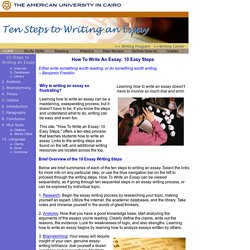 Either write something worth reading, or do something worth writing.-- Benjamin Franklin Brief Overview of the 10 Essay Writing Steps Below are brief summaries of each of the ten steps to writing an essay. Select the links for more info on any particular step, or use the blue navigation bar on the left to proceed through the writing steps. How To Write an Essay can be viewed sequentially, as if going through ten sequential steps in an essay writing process, or can be explored by individual topic. 1. 2. 3. 4. 5. 6. (Note: The title and first paragraph are probably the most important elements in your essay. 7. 8. 9. 10. You're done. My Promise: The Rest of This Site Will Really Teach You How To Write an Essay For half a dozen years I've read thousands of college essays and taught students how to write essays, do research, analyze arguments, and so on. Now it's time to really begin.
Either write something worth reading, or do something worth writing.-- Benjamin Franklin Brief Overview of the 10 Essay Writing Steps Below are brief summaries of each of the ten steps to writing an essay. Select the links for more info on any particular step, or use the blue navigation bar on the left to proceed through the writing steps. How To Write an Essay can be viewed sequentially, as if going through ten sequential steps in an essay writing process, or can be explored by individual topic. 1. 2. 3. 4. 5. 6. (Note: The title and first paragraph are probably the most important elements in your essay. 7. 8. 9. 10. You're done. My Promise: The Rest of This Site Will Really Teach You How To Write an Essay For half a dozen years I've read thousands of college essays and taught students how to write essays, do research, analyze arguments, and so on. Now it's time to really begin.
Creative Writing Journal Prompts
1. Imagine you had a hundred dollars, but you couldn't keep it. You had to give it away to a person or charity. 2. 3. 4. 5. 6. 7. 8. 9. 10. 11. 12. 13. 14. 15. 16. 17. 18. 19. 20. 21. 22. 23. 24. 25. 26. 27. 28. 29. 30. See also: Writing Prompts This page has printable writing prompt worksheets. Persuasive Writing Prompts Check out our collection of persuasive writing topics. Writing Story Pictures Write a creative stories to describe what's happening in these pictures.
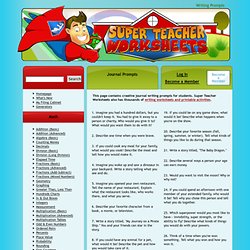
creative writing prompts . com ideas for writers
Writing Prompts
emotions
Online Writing Lab: General Writing
This page is brought to you by the OWL at Purdue University. When printing this page, you must include the entire legal notice. Copyright ©1995-2018 by The Writing Lab & The OWL at Purdue and Purdue University. The Online Writing Lab at Purdue University houses writing resources and instructional material, and we provide these as a free service of the Writing Lab at Purdue. Mission The Purdue On-Campus Writing Lab and Purdue Online Writing Lab assist clients in their development as writers—no matter what their skill level—with on-campus consultations, online participation, and community engagement. A Message From the Assistant Director of Content Development The Purdue OWL® is committed to supporting students, instructors, and writers by offering a wide range of resources that are developed and revised with them in mind. Please don't hesitate to contact us via our contact page if you have any questions or comments. All the best, Garrett Social Media
Writing skills Writing at university can be a daunting task for many students. There is much to learn, such as different genres of writing (reports, essays), how to write in an acceptable academic style, and paraphrasing and using references to avoid plagiarism. Despite the difficulties, writing can be made easier if you break the task down by following the writing process. The following pages will give you help on these aspects of writing, and more. Like the website?
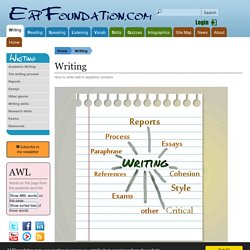
EAP Foundation: Writing
engVid: Writing
engVid’s free writing lessons English Lesson Finder Level 101 Lessons Topics Teachers Find Lessons → writing English for Beginners: Countable & Uncountable Nouns 1-Beginner • writing Fix two BIG errors in English writing! Resume Sample & Tips English resource • business english • writing Parallelism: The secret to great writing 3-Advanced • writing English Grammar: Compound Subjects & Verb Agreement 3-Advanced • grammar • writing Learn to write poetry: THE HAIKU 2-Intermediate • 3-Advanced • culture & tips • writing When to use CAPITAL LETTERS in English 2-Intermediate • 3-Advanced • writing My TOP 5 Writing Tips (for all levels) 1-Beginner • 2-Intermediate • 3-Advanced • business english • writing WRITING – Advanced English Transitions: thereby, thereof, hereby, therein, wherein, whereby… 2-Intermediate • 3-Advanced • vocabulary • writing Writing & Punctuation: How to use COLONS & SEMICOLONS 1-Beginner • 2-Intermediate • 3-Advanced • writing The 10 WORST English mistakes you’re making! Help!
Truths About Fiction
The following essay was previewed in the class that Stephen Graham Jones taught for LitReactor, Your Life Story Is Five Pages Long. 1. The reader should never have to work to figure out the basics of your story. Who’s whose wife or husband, what the time period is if that matters, why these people have broken into this house, and on and on, just the basic, ground-level facts about your story. 2. Meaning you don’t have to lay every last detail of every last thing out. The best writers are the ones who can cover the most distance with the fewest words. 3. It can be as simple as if the story opens with what feels like a dramatic frame—two people sitting by a fireplace, talking over brandy—then we already expect the story to circle back to that fireplace. 4. You open with a hook, of course—the title—then you hook with the first line, then, usually at the end of the first paragraph, you set that hook. 5. They’re not reading so you can render for them their already quotidian lives. 6. 7. 8. 9.
So what do you do when you’re pressed for time, swamped under works and you still need to get some stuff written, and written well? Your nerves are tightened up so well that you can’t sleep, but you can’t squeeze even a sentence out of your mind. I know the feeling so well, but what I did then was, just start writing fast without even thinking, then a professional article was born with the time shorter than usual. Heck, it might be even more professional than my previous articles! (Image Source: Fotolia) The phenomena has nothing to do with the God I worship, or any supernatural phenomenon, it’s just how brain works: we write fast and professionally if we can just limit something, abandon certain habits, and put up some beneficial habits. Articles you might be interested as well: 1. To be honest, I hate this method. (Image Source: Fotolia) If you’re pressed for time and really want get some writing done, open up a fresh Microsoft Word document, and start typing. 2. (Image Source: Fotolia)
Tips And Tricks For Writing
Dystopia
150 amazing images to help students write and think more creatively
Creative Writing Journal Prompts
OWL


 Mentor Text Lessons...inspired by Picture Books
Mentor Text Lessons...inspired by Picture Books
 Enter your e-mail to get the e-book for FREE. We'll also keep you informed about interesting website news. "I have searched the web and used different worksheets, but none have come close to your worksheets and descriptions of (what to do and what not to do). Both courses I have taken have with Creative Writing Now have been amazing. Each time I have learned something new. The one thing I love, you take everything apart and give examples." - Katlen Skye "As usual - I already love the course on Irresistible Fiction, rewriting a lot and improving greatly even after the first lesson. “Essentials of Fiction proved that I could indeed write and I wrote every day, much to my boyfriend's dismay (waa sniff).” - Jill Gardner "I am loving the course and the peer interaction on the blog is fantastic!!!" "I'm enjoying the weekly email course, Essentials of Poetry Writing. "Thank you for all the material in this course. "Thanks very much for this course. "I'm learning so much. "Thank you so much!!
Questionnaires for Writing Character Profiles - Creative Writing Help
Enter your e-mail to get the e-book for FREE. We'll also keep you informed about interesting website news. "I have searched the web and used different worksheets, but none have come close to your worksheets and descriptions of (what to do and what not to do). Both courses I have taken have with Creative Writing Now have been amazing. Each time I have learned something new. The one thing I love, you take everything apart and give examples." - Katlen Skye "As usual - I already love the course on Irresistible Fiction, rewriting a lot and improving greatly even after the first lesson. “Essentials of Fiction proved that I could indeed write and I wrote every day, much to my boyfriend's dismay (waa sniff).” - Jill Gardner "I am loving the course and the peer interaction on the blog is fantastic!!!" "I'm enjoying the weekly email course, Essentials of Poetry Writing. "Thank you for all the material in this course. "Thanks very much for this course. "I'm learning so much. "Thank you so much!!
Questionnaires for Writing Character Profiles - Creative Writing Help
 www.eslfast.com/robot/ What does "Tutor Mike" know? "Tutor Mike" won the second place in International Loebner Prize 2016 Contest in AI "Tutor Mike" won the semifinal in 2015 Chatterbox Challenge and is recognized as one of the top four chatbots on the net "Tutor Mike" won the fifth place in International Loebner Prize 2014 Contest in AI "Tutor Mike" won one first place and one second place in International Loebner Prize 2013 Contest in AI "Tutor Mike" won one first place and one fourth place in International Loebner Prize 2011 Contest in AI ESL: English as a Second LanguageESL Fast Copyright © 2017. All rights reserved. rong-chang ESL, Inc.tesl eslfast.com
www.eslfast.com/robot/ What does "Tutor Mike" know? "Tutor Mike" won the second place in International Loebner Prize 2016 Contest in AI "Tutor Mike" won the semifinal in 2015 Chatterbox Challenge and is recognized as one of the top four chatbots on the net "Tutor Mike" won the fifth place in International Loebner Prize 2014 Contest in AI "Tutor Mike" won one first place and one second place in International Loebner Prize 2013 Contest in AI "Tutor Mike" won one first place and one fourth place in International Loebner Prize 2011 Contest in AI ESL: English as a Second LanguageESL Fast Copyright © 2017. All rights reserved. rong-chang ESL, Inc.tesl eslfast.com
 Global rating average: 0.0 out of 50.00.00.00.00.0 These sites explain how to use similes and metaphors to improve your writing. There are many examples plus interactive quizzes and classroom activity ideas. Includes links to eThemes Resources on personification and other forms of figurative language. Grades Links ReadWriteThink Activities on Similes, Metaphors, Poetry This site provides a variety of activities using language and poetry. Education Standards Request State Standards
Writing: Similes and Metaphors
Global rating average: 0.0 out of 50.00.00.00.00.0 These sites explain how to use similes and metaphors to improve your writing. There are many examples plus interactive quizzes and classroom activity ideas. Includes links to eThemes Resources on personification and other forms of figurative language. Grades Links ReadWriteThink Activities on Similes, Metaphors, Poetry This site provides a variety of activities using language and poetry. Education Standards Request State Standards
Writing: Similes and Metaphors


 In traditional literary theory, it is assumed that when we read a work of literature we are trying to find a meaning which lies inside that work. Literary texts possess meaning, and that is why readers extract meaning from them. The process of extracting meaning from texts is called interpretation. However, in contemporary literary and cultural theory such ideas have been radically changed. It is now believed that works of literature are built from systems, codes, and traditions established by previous works of literature. It is claimed that the act of reading, rather than the interpretation of one work, engages the reader in discovering a network of textual relations. The word “intertextuality” derives from the Latin intertexto, meaning to ‘mingle while weaving’ (Keep et al 2000). The origins of intertextuality, like modern literary and cultural theory itself, can be traced back to 20th-century linguistics. “Any text is a new tissue of past citations. Resources:
An introduction to intertextuality
In traditional literary theory, it is assumed that when we read a work of literature we are trying to find a meaning which lies inside that work. Literary texts possess meaning, and that is why readers extract meaning from them. The process of extracting meaning from texts is called interpretation. However, in contemporary literary and cultural theory such ideas have been radically changed. It is now believed that works of literature are built from systems, codes, and traditions established by previous works of literature. It is claimed that the act of reading, rather than the interpretation of one work, engages the reader in discovering a network of textual relations. The word “intertextuality” derives from the Latin intertexto, meaning to ‘mingle while weaving’ (Keep et al 2000). The origins of intertextuality, like modern literary and cultural theory itself, can be traced back to 20th-century linguistics. “Any text is a new tissue of past citations. Resources:
An introduction to intertextuality
 Either write something worth reading, or do something worth writing.-- Benjamin Franklin Brief Overview of the 10 Essay Writing Steps Below are brief summaries of each of the ten steps to writing an essay. Select the links for more info on any particular step, or use the blue navigation bar on the left to proceed through the writing steps. How To Write an Essay can be viewed sequentially, as if going through ten sequential steps in an essay writing process, or can be explored by individual topic. 1. 2. 3. 4. 5. 6. (Note: The title and first paragraph are probably the most important elements in your essay. 7. 8. 9. 10. You're done. My Promise: The Rest of This Site Will Really Teach You How To Write an Essay For half a dozen years I've read thousands of college essays and taught students how to write essays, do research, analyze arguments, and so on. Now it's time to really begin.
Either write something worth reading, or do something worth writing.-- Benjamin Franklin Brief Overview of the 10 Essay Writing Steps Below are brief summaries of each of the ten steps to writing an essay. Select the links for more info on any particular step, or use the blue navigation bar on the left to proceed through the writing steps. How To Write an Essay can be viewed sequentially, as if going through ten sequential steps in an essay writing process, or can be explored by individual topic. 1. 2. 3. 4. 5. 6. (Note: The title and first paragraph are probably the most important elements in your essay. 7. 8. 9. 10. You're done. My Promise: The Rest of This Site Will Really Teach You How To Write an Essay For half a dozen years I've read thousands of college essays and taught students how to write essays, do research, analyze arguments, and so on. Now it's time to really begin.

 EAP Foundation: Writing
EAP Foundation: Writing